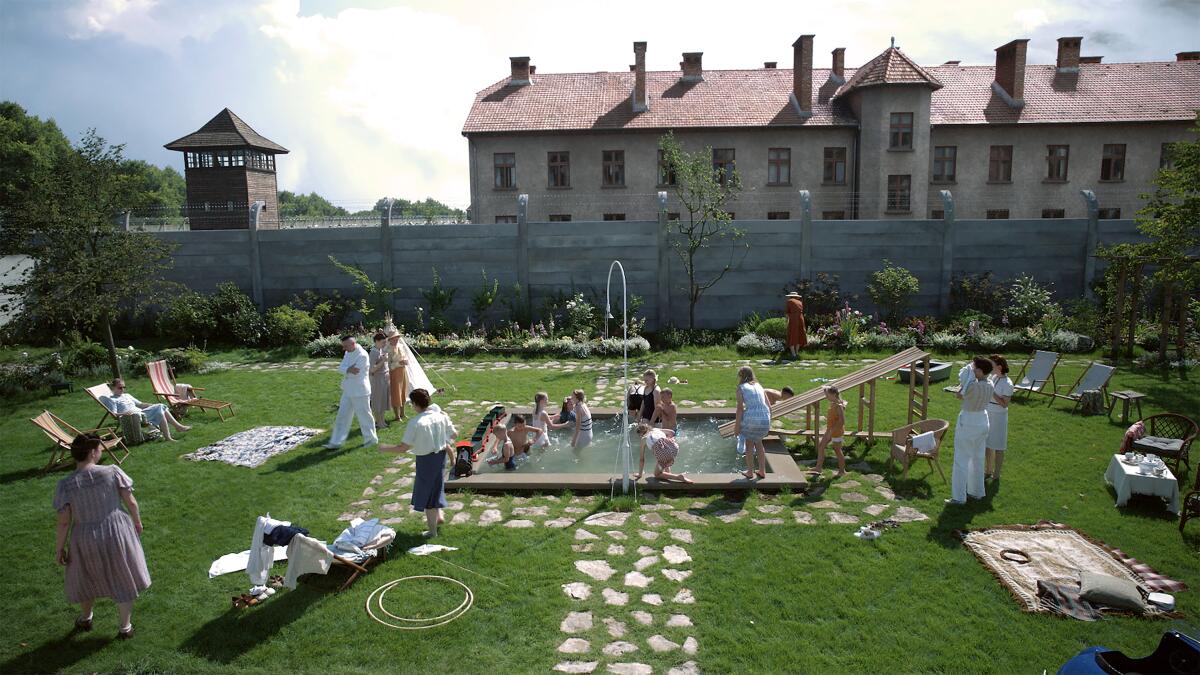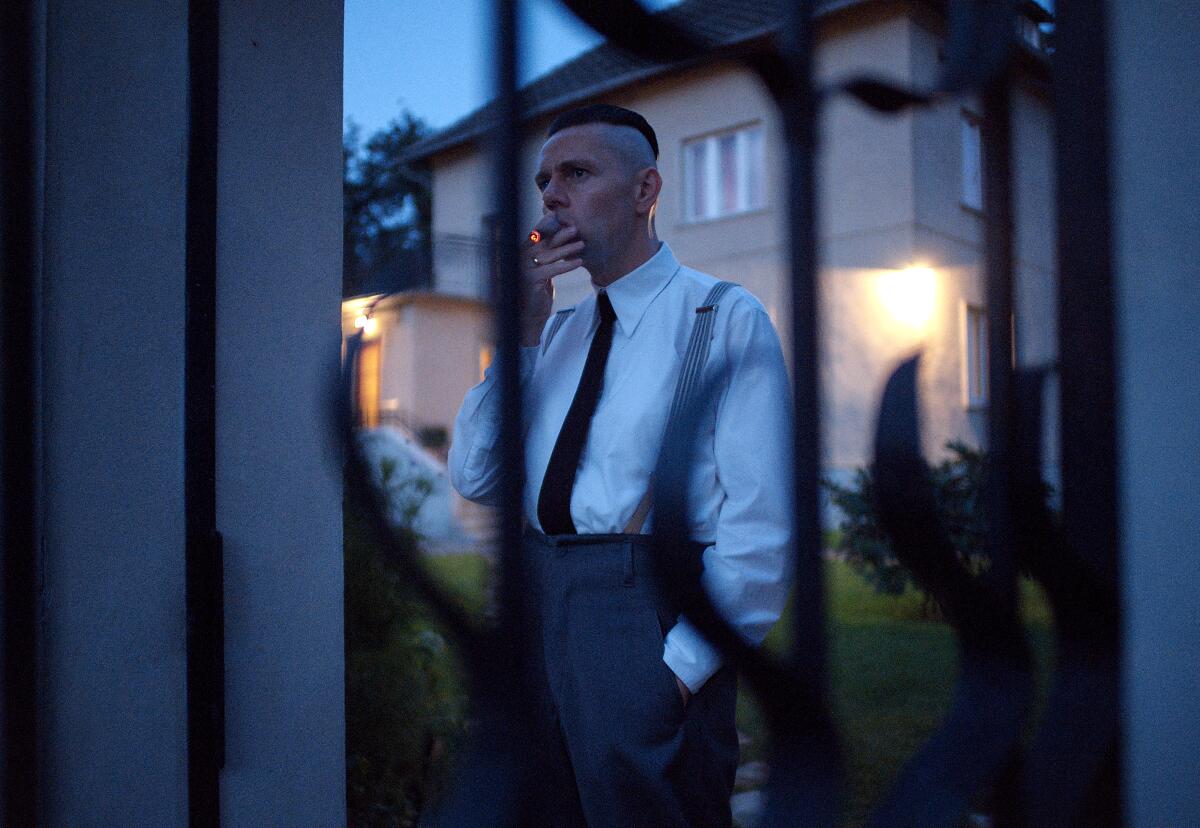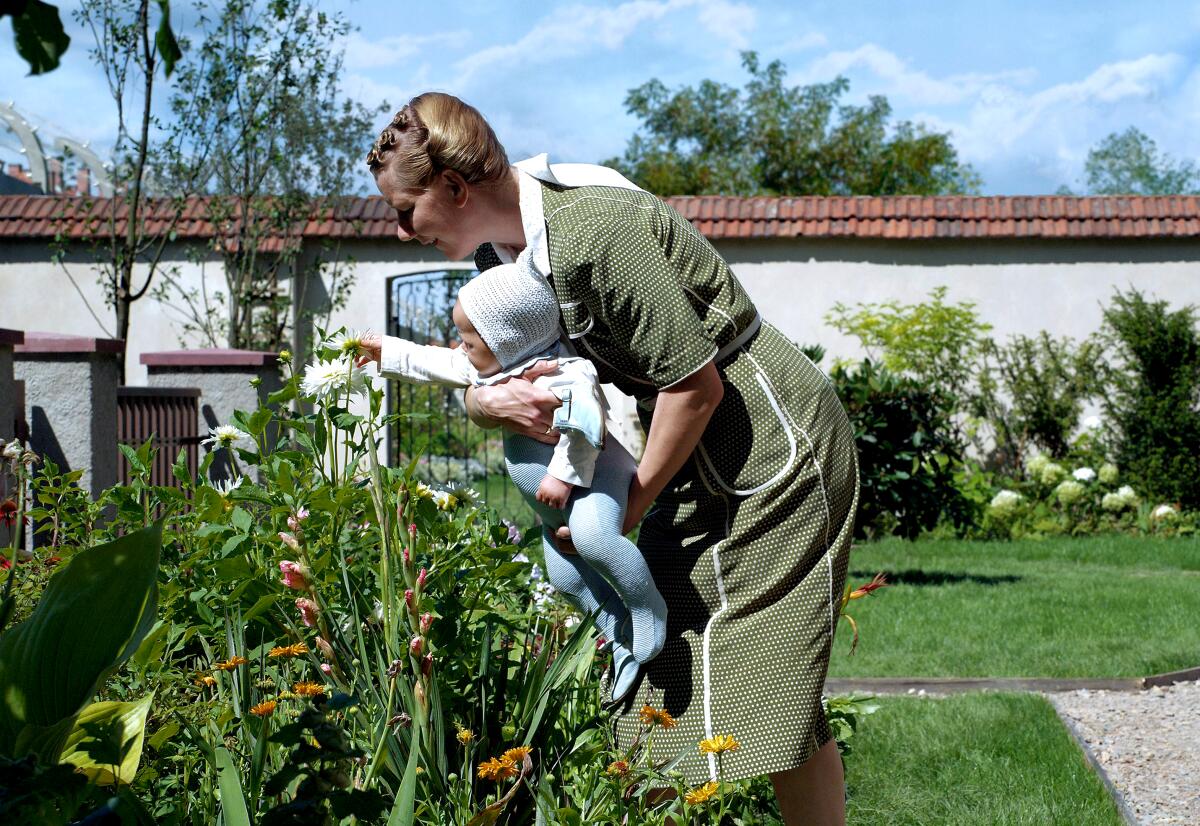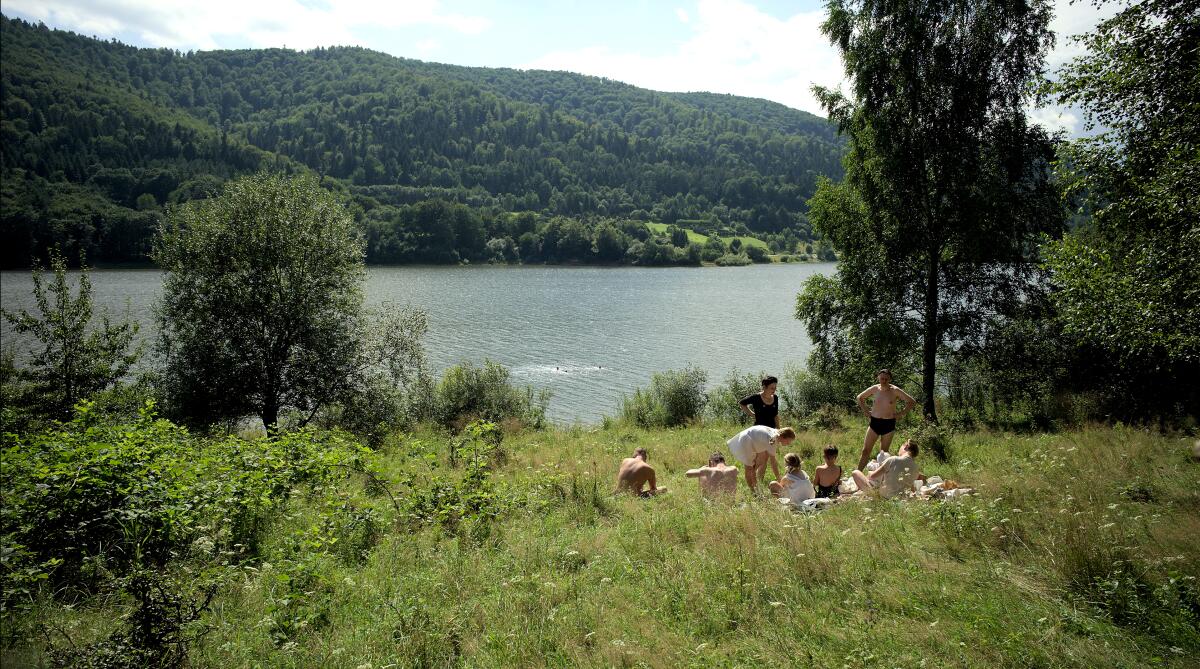‘The Zone of Interest,’ a masterpiece set next door to Auschwitz, gets under the skin

- Share via
What does a Nazi do on his day off? Things any of us might do, especially on a sunny afternoon: He takes the family out for a countryside picnic, watching them eat, play and splash in a river and then hiking with them back to the car. Along the way, a baby cries and squirms; her older siblings bicker on the drive home. And what a home it is, a stately villa with many rooms and a gated garden where flowers, fruits and vegetables grow in abundance. There’s also a greenhouse, a swimming pool and a long concrete wall, edged with barbed wire, that only partially obstructs the family’s view of the concentration camp next door.
“The Zone of Interest,” the brilliantly disquieting new movie from the English writer-director Jonathan Glazer, never brings us over that camp wall. It’s a horror film that keeps its horrors rigorously hidden from view. But while restrained in form and implications, “Zone” is never coy, and is surprisingly quick to disgorge its secrets. The camp is Auschwitz. The Nazi is Rudolf Höss (played by Christian Friedel), the camp’s longest-serving commandant. Glazer, drawing very loose inspiration from a 2014 novel by the late Martin Amis, confines his narrative focus to the period between 1943 and 1944, and he grounds his spare story in the everyday rhythms and meticulously researched details of the Hösses’ family life.
The quality of dread that he sustains over an eerie, exactingly precise 106 minutes stems from our disturbing realization of just how quotidian that life is. Here is a house so well run that the business of mass murder happening a stone’s throw away has been thoroughly, almost imperceptibly routinized. There’s a darkly funny early shot of Rudolf riding a horse from his yard up to the gates of Auschwitz, completing the world’s shortest, ghastliest commute. When he later blows out the candles on his birthday cake, surrounded by his wife, Hedwig (Sandra Hüller, “Anatomy of a Fall”), and their five children, you may not immediately notice the camp guard tower looming in the window behind him.

By this point, your mind may have already summoned the words “the banality of evil,” the immortal phrase that Hannah Arendt coined in the 1960s when writing about Adolf Eichmann, one of Höss’ Third Reich associates. The expression was much bandied about by critics (myself included) after “The Zone of Interest” premiered and won the Grand Prix at this year’s Cannes Film Festival. But not all banality is created equal — and not all evil is created equal, either. The specific achievement of this movie, recently named the best picture of the year by the Los Angeles Film Critics Assn., is to explore evil without glamorizing it, and to transmute the mundane into something quietly mesmerizing.
Working mostly inside a re-creation of the Hösses’ house built very close to the Auschwitz camp site (the meticulous production design is by Chris Oddy), Glazer and his cinematographer, Łukasz Żal (“Ida,” “Cold War”), composed their shots and filmed their actors using multiple hidden cameras. Much of the resulting imagery has the unsettling intimacy of high-tech surveillance footage, a quality reinforced by Paul Watts’ editing, which sometimes tracks the characters’ movements so assiduously it’s as if the cuts were being activated by motion sensors. The guiding impulse seems to have been to purge every hint of warmth or subjectivity from the frame, and to subject the Hösses to a gaze as inhuman as their own.
With a chilly austerity worthy of Stanley Kubrick or Michael Haneke, Glazer turns a static shot into a booby trap and a daily activity into an indictment. When Hedwig slips into her bedroom to try on a new fur coat, it takes a beat to register that the garment’s owner has just been gassed and cremated. Groceries are wheelbarrowed to the front door by a deliveryman whose significance you don’t grasp until he turns his back, revealing the red prisoner stripe on his jacket. At night, one of the Höss children sits in bed poring over a stash of gold teeth, presumably a gift from Papa. Outside in the hall, his sister sits alone at a window, transfixed by the smoky orange glow she sees outside and the groaning, mechanized roar she hears.

What she hears, and what we hear, is of extraordinary significance. “The Zone of Interest” opens on a pitch-black screen and a blast of Mica Levi’s spare, demonically intense score; we could be listening to Druidic chants in hell — chords of lush, operatic dread and terror that might seem disproportionate to the becalmed images that follow. But even as Levi’s orchestrations recede, an equally detail-rich music intrudes: bits of birdsong, echoing footfalls and, before long, dogs’ barks, human screams, crackling flames, whistling trains and the unmistakable sound of gunshots. Even in simple scenes of the Hösses at work or at play, this chilling aural undertow never ceases. As conceived by the sound designer Johnnie Burn, it’s so vividly enveloping that you might want to heighten its impact by closing your eyes.
Don’t, though. Part of what gives the movie its queasy fascination is that we’re not just observing its characters, but we’re observing what they observe and inevitably questioning what they know. Some though not all of the children seem sweetly oblivious. Their parents’ guilt is of course beyond doubt, and to say that they have turned a blind eye to their complicity, or are in a state of denial, is to extend them unconscionable charity. Hedwig, far from denying anything, seems to have long ago accepted the conditions of her family’s wealth and comfort, none of which are lost on her as she shows off her garden to her visiting mother and proudly proclaims herself the “Queen of Auschwitz.”
That garden is in some ways crucial to unlocking “The Zone of Interest.” Metaphors may have no place at a concentration camp, but it’s hard to look at this beautiful enclosed space and not see it, perversely, as the most despoiled of Edens. Here, in a short montage of intensely hued floral closeups, Glazer suggests an overpowering residue of death: the ashen remains that have descended on these flowers, seeped into the soil and contaminated the fruits and vegetables. Day after day, the Hösses are turning more and more into what they eat, what they breathe and who they kill. Meanwhile, under cover of darkness, an unidentified young girl bravely sneaks out of her own home at night and leaves apples along the road for the prisoners of Auschwitz to find. These moments, shot with thermal imaging cameras, resemble black-and-white photonegatives, as if to suggest just how alien an act of goodness and resistance has become.
The extremity of that formal choice can’t help but remind me of Glazer’s “Under the Skin” (2013), a bewitchingly creepy sci-fi thriller that was, in some ways, as radical a study in anti-empathy as this one. In that movie, an extraterrestrial being regards a screaming, abandoned human child with understandable indifference. The automatons in SS uniforms we see in “The Zone of Interest” have no such excuse. Here, a man sits stone-faced as he studies blueprints for a maximum-efficiency crematorium, one of many technical innovations that will make Höss one of the most prodigious mass murderers in history.

That we never see those murders — the bloodstains on Rudolf’s boots are as close as we get — renders Friedel’s performance all the more galvanizing in its restraint, a restraint that the camera echoes by keeping its distance from the actors, registering body language as much as expression. Rudolf enters every situation with a calmly appraising eye; he shows affection to his kids and seldom raises his voice. As the lady of the house, Hüller cuts a loathsome, terrifying figure: She’s a hausfrau Lady Macbeth, all inelegant vanity and hectoring manipulation. When Rudolf learns he’s being transferred to a new post in Oranienburg, Germany, potentially upending their idyllic existence, Hedwig screams and rants and sheds crocodile tears. “This is the life we’ve always dreamed of,” she protests, a claim whose utter horror sinks into your marrow.
From there, “The Zone of Interest” morphs into a kind of Third Reich boardroom thriller that plays, at times, like a pitch-black comedy about work-life balance. Are we meant to see ourselves reflected in the Hösses, hard-working souls who just want to live in their lovely house, throw fabulous parties and enjoy their home-grown produce? Are we meant to be implicated in our own indifference, our willful avoidance of the barbarism in our own backyards?
Yes and no, I suspect. The oft-stated purpose of movies about history, and about the Holocaust in particular, is to allow the past to speak to the present. But something about the unnerving intelligence of Glazer’s conception, the obsessive intensity with which he has excavated and re-enacted this chapter of history, resists the usual bromides about finding the universal in the specific.
When the real-life Höss was executed for his crimes in April 1947, the gallows was built just 100 meters from this once-cherished house, a domestic paradise that operated in the shadow of an inferno. Could he see his house from where he stood on the gallows, and if so, did it fill him with one final, bitter twinge of irony? The movie doesn’t say. His psychology is of minimal concern or insight, and his death falls outside this movie’s own temporal zone of interest. But the conclusion that Glazer arrives at, with a sudden formal rupture, is shattering in ways that defy easy description. More than any movie I’ve seen this year, or perhaps any year, “The Zone of Interest” leaves you pondering the magnitude of what the banality of evil has wrought — and the terrible, inconsolable void that it leaves behind.
'The Zone of Interest'
In German and Polish, with English subtitles
Rating: PG-13, for thematic material, some suggestive material and smoking
Running time: 1 hour, 46 minutes
Playing: Starts Dec. 15 at AMC Century City 15; Vista Theatre
More to Read
Only good movies
Get the Indie Focus newsletter, Mark Olsen's weekly guide to the world of cinema.
You may occasionally receive promotional content from the Los Angeles Times.











